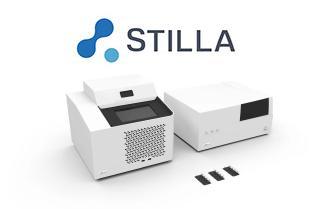
News Express
Warmly celebrate the French Stilla technologies' investment in the PHILIPS Group to develop a total solution for personalized cancer treatment.
On November 23, 2017, the Royal Philips Group of the Netherlands and its partners announced that they will invest 6.3 million euros in support of the "LIQUID biopsies and IMAging for improved cancer care" project, which is a four-year project aimed at adopting advanced liquid biopsy technology. Combined with magnetic resonance imaging (MRI) diagnostic techniques to improve the accuracy of genetic and functional characteristics of primary and rectal cancer.

Based on the high sensitivity and high precision of the advanced Naica TM Crystal automatic micro-drop chip digital PCR system, Stilla Technologies of France is responsible for the analysis and detection of ctDNA in liquid biopsy. Since 2016, this innovative three-color detection digital PCR system has been listed in Europe and the United States, and officially entered the Chinese market in 2017. It has been widely recognized in the field of molecular detection and diagnosis, such as clinical research institutions and diagnostic reagent development companies. The degree of integration, the superior performance of 25,000~30,000 effective droplets, and the powerful and user-friendly software interface are all very satisfactory feedback on the market.
In September 2017, Dr. Remi Danglas, President and Founder of the company, said: Users of Stilla Technoloiges are very satisfied with the ease of use of the Naica Crystal digital PCR platform and the ability to provide 3-color fluorescent channels, for users conducting liquid biopsy studies, The limitation of biological sample size, especially ctDNA detection that does not require tissue biopsy, is very urgently required for multiple detection channels for cancer detection. It also indicates that the fluorescence detection channel is increased from 3 channels to 6 channels.
Joining the “LIMA Project” means that Stilla technologies will have more developments in the direction of ctDNA detection in liquid biopsy, providing tools and techniques for detecting genetic characteristics for early cancer treatment, and allowing liquid biopsy as a method of identification for individualized solutions. One of them is integrated into the clinical workflow, allowing clinicians to better understand the effectiveness of the treatment plan and to guide the patient's next personalized treatment plan.
The original English news can be found at the link: https://european-biotechnology.com/up-to-date/latest-news/news/philips-leads-eur63m-eu-liquid-biopsy-consortium.html
The original Chinese translation is as follows:
The Philips-led research team has allocated €6.3 million to the European Union for the development of a holistic approach to personalized cancer treatment.
• The study is a four-year study designed to improve the accuracy of genetic and functional characteristics of primary breast and rectal cancer
• Clinical research conducted by the Utrecht University Medical Center in the Netherlands and the French National Institute of Research and Medicine
AMSTERDAM, The Netherlands - Royal Philips (NYSE: PHG, AEX: PHIA) is a global leader in health technology and today announced that it will fund a €6.3 million Horizon 2020 EU project to develop cancer. A holistic treatment plan for personalized treatment. The project, which is a four-year project called "Liquid biopsies and IMAging for improved cancer care" (LIMA), aims to improve primary breast cancer through a combination of advanced liquid biopsy and magnetic resonance imaging (MRI) diagnostic techniques. And the accuracy of the study of the genetic and functional characteristics of rectal cancer, clinical research will be carried out at the University of Utrecht Medical Center in the Netherlands and the French National Institute of Medicine.
Integrate personalized treatment into clinical workflows
Each patient and tumor is unique, and treatment regimens that are usually effective for one patient are not effective for the other. The LIMA program aims to develop and validate the tools and techniques available in the early stages of cancer treatment, enabling clinicians to better understand the effectiveness of treatment options and to guide the patient's next personalized treatment options.
Liquid biopsy is an advanced laboratory test analysis of routinely collected blood samples that provides support for diagnosis by providing deep genetic information for tumors and in vivo metastases. The blood sample contains circulating tumor DNA (ct-DNA) or circulating tumor cells (CTC). MRI provides physicians with information about the location of cancer and functional information about the structure of the tumor. For example, diffusion-weighted MRI and perfusion magnetic resonance imaging (on-line imaging commonly used in oncology) will further develop applications in tumor detection and signature detection to provide comprehensive and quantitative information for comprehensive diagnostic protocols. In addition, MRI will analyze tumor and surrounding contrast characteristics to elucidate tumor grading and biological status, an area of ??imaging science known as "radiomics."
Hans Hofstraat, Philips' innovative project manager, said: "We will work with our partners to combine a range of liquid biopsy technologies that provide us with more detailed molecular information and advanced MRI technology. To enable us to better understand the role of early cancer treatment. It may also improve the patient's prognosis, which may mean an important step forward in providing personalized cancer treatment."
“By liquid biopsy, we can analyze circulating tumor DNA and tumor cells of advanced cancer in a specific part of the body,” said Alain Thenry, research director at the National Institute of Medical Research (INSERM) in Montpellier, France. . “This technology is an important emerging area of ??diagnostics, especially in the field of oncology, which will also have a positive impact on patient care.”
“This project will enable us to establish a more detailed way of looking inside the body, and it is very likely to improve the treatment options we offer and have a significant positive impact on the lives of patients” Associate Professor, University of Utrecht Medical Center (UMC), The Netherlands And research coordinator Kenneth Gilch said. “By understanding the effects of early cancer treatment, we will be able to provide more targeted and effective treatments.”
In addition to Philips, INSERM and UMC in the Netherlands, the project involves several SMEs that have developed innovative liquid biopsy technologies: Agena Bioscience GmbH in Germany, DiaDx in France and Stilla Technologies in France. British ANGLE plc is used to separate CTC and German ALS automated laboratory solutions GmbH for single CTC detection and selection.
Horizon 2020 is the largest-ever EU Research and Innovation program, with the goal of ensuring Europe produces world-class science, removes barriers to innovation and makes it easier for the public and private sectors to work together in delivering innovation.
The “Horizon 2020” project is the largest research and innovation project in the history of the European Union. The goal is to ensure that Europe maintains a world-class scientific level, removes barriers to innovation, and makes it easier for public and private institutions to collaborate to promote innovation.
For more information on Stilla Technologies in France, please click: http://www.cycloudbio.com/product/18887.html



